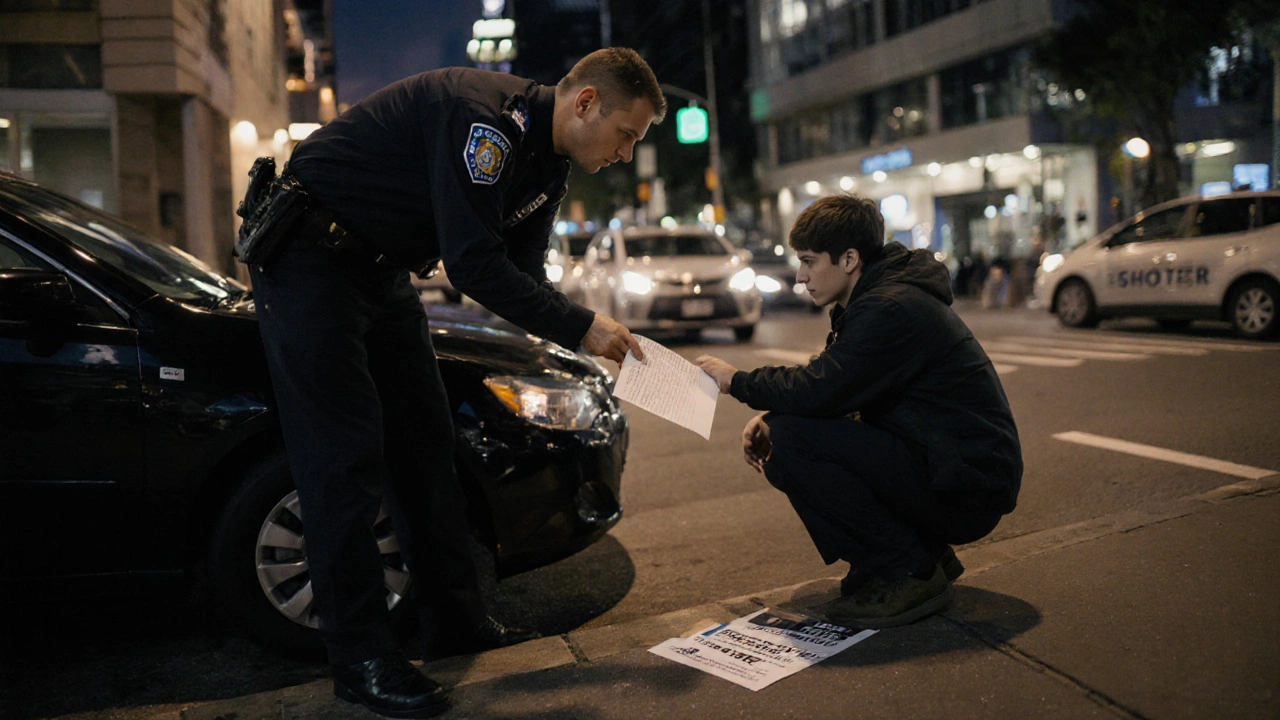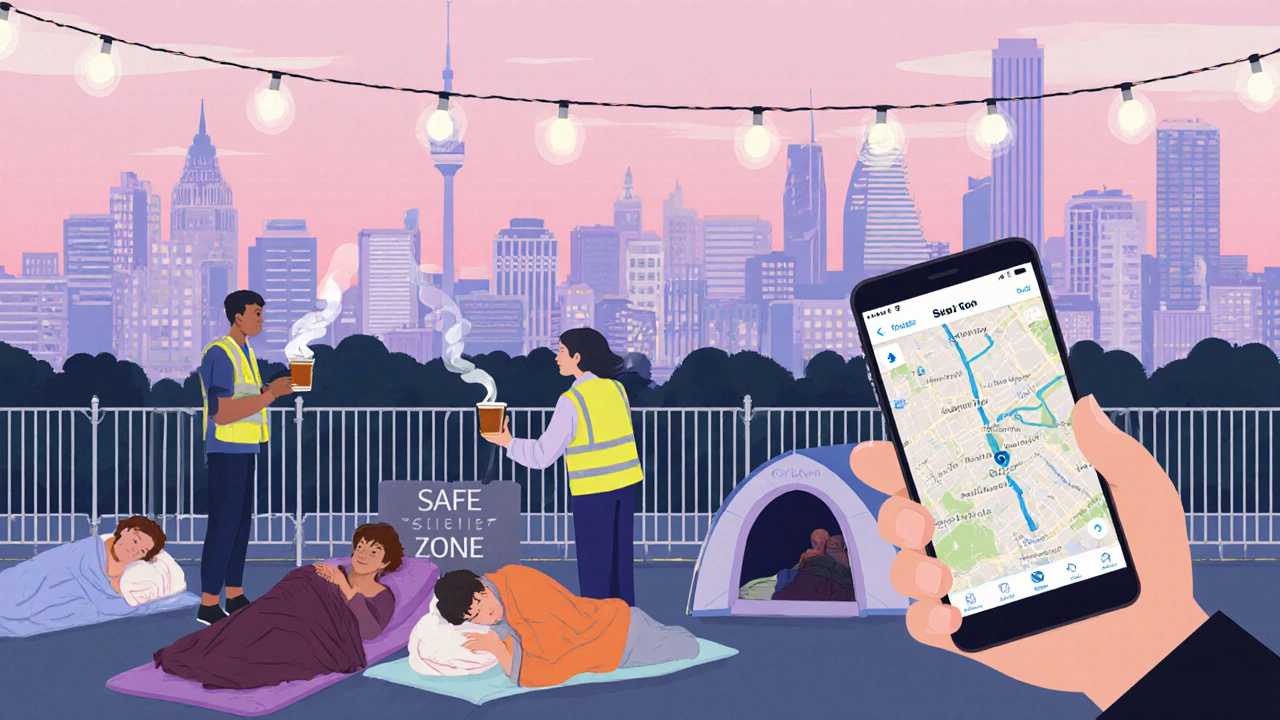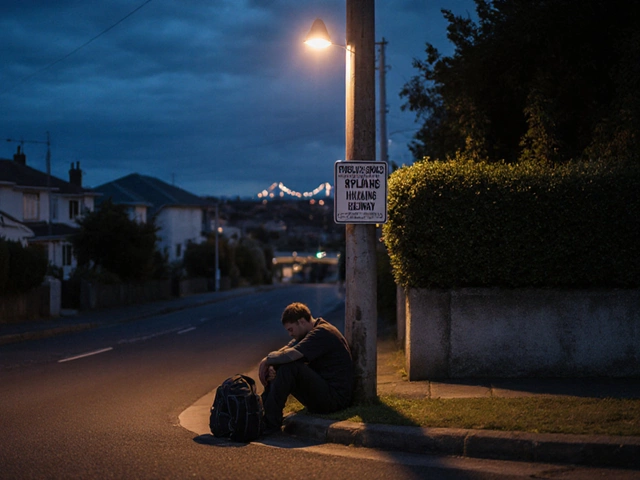Roadside Sleeping Guide for New Zealand
Check Your Local Rules
Select your city to see specific regulations regarding sleeping on the side of the road.
When you wonder "Am I allowed to sleep on the side of the road?", you’re really asking about the legal boundary between public space and personal safety. In New Zealand the answer isn’t a simple yes or no - it depends on national statutes, local council bylaws, and how police choose to enforce them. This guide walks you through the rules, the rights you have, and practical steps to stay safe if you ever find yourself on a street curb.
What "roadside sleeping" actually means
Roadside sleeping is a term used by authorities and service providers to describe the act of sleeping in or next to a public roadway, footpath, or other publicly owned space that is not designated for overnight accommodation. It includes sleeping on the verge of a highway, under a bridge, or in a car parked on a street. The definition matters because many bylaws target the location (public land) rather than the activity itself.
National legislation that touches on sleeping outdoors
- Summary Offences Act 1981: Sections 12A and 12B make it an offence to loiter in a public place with the intention of sleeping if the behaviour is likely to cause annoyance or inconvenience to others.
- Criminal Justice Act 1985: Gives police powers to remove a person from a place if they are deemed a public nuisance.
- Public Health and Safety Act 2020: Allows local authorities to issue notices to clear areas that present health or safety risks, which can include makeshift sleeping sites.
- New Zealand Bill of Rights Act 1990: Guarantees freedom from discrimination and the right to humane treatment, which courts have interpreted as protecting vulnerable people from arbitrary removal.
These statutes don’t explicitly forbid sleeping on a road, but they give powers to intervene when the act creates a risk to health, safety, or public order.
How Auckland and other councils regulate roadside sleeping
Auckland Council enforces a Public Space Bylaw that defines "public place" and outlines prohibited conduct, including sleeping on footpaths or in areas where it could obstruct traffic or pose a fire hazard. The council can issue a removal notice, fine up to $500, or order a person to relocate to a shelter.
Other major cities have similar rules:
- Wellington City Council: Uses the Public Safety By‑law to target sleeping that blocks pedestrian pathways.
- Christchurch City Council: Applies the Temporary Accommodation Regulation, which allows removal of encampments after a 48‑hour notice.
- Hamilton City Council: Relies on the Public Order Act to fine and relocate individuals who sleep on road shoulders where it interferes with traffic flow.
The key point is that each council can act, but the thresholds differ. Auckland tends to be stricter because of higher traffic density and limited shelter space.
What police actually do on the ground
Police discretion is crucial. Officers often balance the legal provisions with public health concerns. In practice you’ll see three main approaches:
- Referral: An officer may simply give you the contact details of a nearby shelter or outreach service.
- Warning: A verbal warning that you must move within a short timeframe, especially if you’re in a hazardous location.
- Enforcement: Issuing a formal removal notice or, in extreme cases, filing a nuisance charge that could lead to a fine.
Record-keeping is important. If you receive a notice, ask for a copy and note the officer’s badge number. That paper trail can be useful if you need to appeal the decision later.

Your rights when faced with a removal notice
The New Zealand Bill of Rights Act 1990 gives you the right to be treated with dignity and to be free from arbitrary deprivation of liberty. While it doesn’t give a blanket right to sleep on a road, it does mean any enforcement must be proportionate and justified.
If you believe a notice breaches your rights, you can:
- Request the council’s written justification for the removal.
- Contact the Human Rights Commission for mediation.
- Seek legal advice from community law centres like Auckland Community Law Centre.
Most cases are resolved through outreach programs rather than court battles, but knowing your rights can prevent unnecessary penalties.
Safer alternatives you should consider first
Before testing the legal limits, explore these options that often have a lower risk of legal trouble:
- Emergency shelters: Auckland’s City Mission runs a 24‑hour shelter with no booking required.
- Housing First programs: Provide permanent housing without pre‑conditions, reducing the need for street sleeping.
- Transit hotels: Some bus stations partner with local NGOs to offer short‑term rooms.
- Drop‑in day centres: Offer a safe place to rest during daylight hours, reducing exposure to police enforcement.
If you’re in a crisis, call 111 for immediate assistance or dial 0800 911 555 for the national helpline, which can direct you to the nearest shelter.
Practical tips if you must sleep on the side of the road
- Pick a low‑traffic spot: A quiet residential street with good lighting lowers the risk of accidents and police attention.
- Stay visible but not obstructive: Keep your belongings in a small bag, avoid blocking footpaths, and stay clear of road edges.
- Carry identification: A driver’s licence, health card, or a note from a support worker can help explain your situation if approached.
- Document the environment: Take photos of the area, note any signs posted, and keep a log of any interactions with authorities.
- Know the nearest service points: Map out the closest shelters, community kitchens, and clinics before you settle for the night.
- Look for safe‑sleep initiatives: Some councils run “safe‑sleep zones” where overnight stays are tolerated for a limited time.
These steps don’t guarantee you won’t be asked to move, but they show you’re acting responsibly, which can influence an officer’s discretion.

Key takeaways
- There is no specific law that outright bans roadside sleeping, but several statutes give police and councils power to intervene when safety or public order is at risk.
- Auckland’s bylaws are among the strictest; other cities have similar but slightly more flexible rules.
- Your human‑rights protections mean any removal must be justified and proportionate.
- Exploring shelters, housing‑first programs, and day centres is usually safer and more sustainable.
Frequently Asked Questions
Can I be fined for sleeping on a footpath?
Yes. In Auckland a council notice can carry a fine of up to $500 if the sleeping is deemed a nuisance or safety risk. The fine is applied after a verbal warning unless you move promptly.
Do I have a right to stay where I am if I’m homeless?
You have the right to be treated with dignity, but public land is not private property you can occupy indefinitely. Councils can require you to relocate for health or safety reasons.
What should I do if police ask me to move?
Ask politely for a written notice, note the officer’s badge number, and request information about nearby shelters. You can also contact the Human Rights Commission if you feel the request is unfair.
Are there any “safe‑sleep zones” in Auckland?
Auckland has pilot “safe‑sleep” areas near the city centre where temporary overnight stays are tolerated for up to 72 hours, provided you do not block pathways or create a fire hazard.
How can I find the nearest shelter quickly?
Call the national helpline 0800 911 555 or use the Auckland Shelter Finder app, which lists real‑time availability for all city shelters.
Comparison of major city roadside‑sleeping policies (2025)
| City | Bylaw Name | Maximum Fine | Enforcement Priority | Safe‑Sleep Zone Available? |
|---|---|---|---|---|
| Auckland | Public Space Bylaw | $500 | High - traffic safety focus | Yes, pilot areas near CBD |
| Wellington | Public Safety By‑law | $400 | Medium - focus on pedestrian flow | No dedicated zones |
| Christchurch | Temporary Accommodation Regulation | $300 | Medium - after natural disaster response | Limited trial sites |
| Hamilton | Public Order Act | $250 | Low - only when obstruction occurs | No |
These numbers illustrate that the roadside sleeping laws vary widely. Knowing your city’s specific penalties and whether a safe‑sleep zone exists can guide where you choose to rest for the night.
Next steps if you’re currently sleeping on the road
- Call the local helpline (0800 911 555) and ask for the nearest emergency shelter.
- Document your current location and any notices you receive.
- If you’re issued a fine, keep the receipt and consider contacting a community law centre for advice on contesting it.
- Explore long‑term solutions like the Housing First program, which many councils are scaling up in 2025.
- Stay informed - council bylaws are updated annually, and community newsletters often announce new safe‑sleep zones.
Being proactive, knowing your rights, and using the resources available can make the difference between a night of uncertainty and a clear path toward stable housing.






